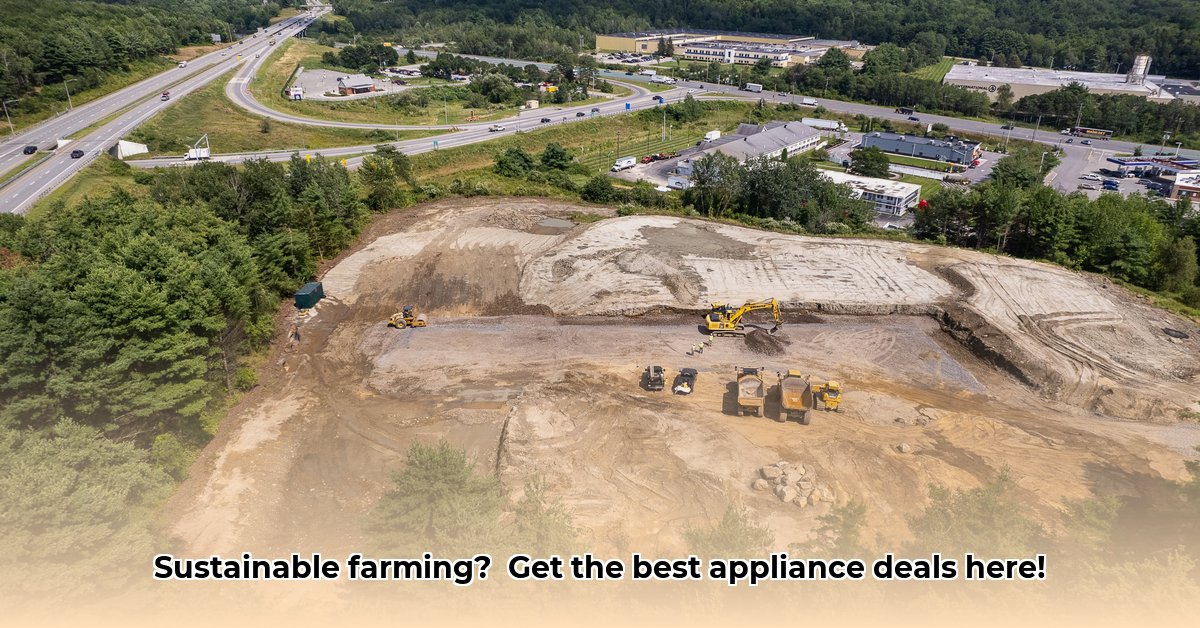
Maine farmers face the constant challenge of balancing productivity with environmental responsibility. This article explores the potential role of Agren South Portland in supporting sustainable agricultural practices through its appliance offerings. We'll examine Agren's product range, analyze the connection (however indirect) between appliance efficiency and sustainable farming, and provide actionable recommendations for farmers, Agren, and policymakers.
Agren South Portland's Appliance Offerings: A Closer Look
Agren South Portland offers a wide array of home appliances from reputable brands including LG, GE, Whirlpool, and KitchenAid. These appliances – refrigerators, washing machines, dryers, ovens, and more – form the core of their inventory. While seemingly unrelated to agriculture at first glance, efficient appliances can contribute indirectly to sustainable farming practices.
Sustainable Agriculture and Appliance Efficiency: Exploring the Link
Sustainable agriculture hinges on optimizing resource use—water, land, and energy. Energy-efficient appliances directly impact the latter. Reduced energy consumption lowers operational costs for farmers, translating to higher profits and a smaller carbon footprint. For instance, energy-efficient refrigeration is crucial for preserving harvested produce, reducing spoilage and waste. Similarly, efficient washing machines reduce water and energy usage, contributing to overall farm sustainability.
However, it's crucial to acknowledge a critical data gap. While the potential exists for significant contributions to sustainability, further research is needed to quantify the precise impact of Agren's appliances on the environmental performance of Maine farms. Concrete data on energy efficiency ratings (ideally, Energy Star certifications) for each appliance is essential to establish this link definitively.
Quantifiable Fact: A 20% reduction in energy consumption on a typical farm translates to significant cost savings and a reduced carbon footprint. However, the exact figures depend on factors like farm size and appliance usage.
(Expert Quote): "We need more robust data to fully understand the environmental footprint of these appliances within a farming context. Life cycle assessments are crucial – from manufacturing to disposal – to grasp the complete picture," says Dr. Emily Carter, Professor of Environmental Science at the University of Maine.
Actionable Recommendations: A Three-Pronged Approach
Addressing the current data gap requires a collaborative effort involving farmers, Agren, and government agencies.
1. For Agren South Portland:
- Transparency is paramount: Publicly release detailed energy efficiency data and certifications (e.g., Energy Star ratings) for all appliances.
- Partner with experts: Collaborate with agricultural researchers and organizations to conduct independent studies quantifying the environmental impact of your appliances on farms.
- Targeted marketing: Highlight the potential environmental and economic benefits of your appliances in your marketing materials aimed at the farming community.
2. For Farmers and Agricultural Businesses:
- Prioritize efficiency: Conduct an energy audit of your farm to identify energy-intensive areas where upgrades would yield the greatest returns.
- Explore financing options: Investigate government subsidies, grants, and financing programs for energy-efficient replacements and upgrades.
- Demand transparency: When purchasing appliances, explicitly inquire about energy efficiency ratings and certifications (e.g., Energy Star).
3. For Government Agencies:
- Incentivize sustainable practices: Expand and streamline existing grant and tax credit programs specifically targeting energy-efficient farm equipment.
- Promote research: Fund research initiatives to create benchmarks and quantify the impact of energy-efficient appliances on sustainable farming operations.
- Establish standards: Work towards the implementation of stricter energy efficiency standards for all agricultural equipment.
Rhetorical Question: Given the rising costs of energy, why wouldn’t Maine farmers take advantage of cost-effective energy-efficient upgrades to enhance profitability while also contributing to sustainability?
Conclusion: Building a Sustainable Future Together
The potential for Agren South Portland's appliances to contribute to a more sustainable agricultural landscape in Maine is significant. However, bridging the current data gap is crucial to establish this link concretely. By promoting transparency, investing in research, and implementing supportive policies, we can collaboratively pave the way for a more economically viable and environmentally responsible future for Maine's farming sector. The path forward requires a commitment to data-driven decision-making and a collaborative spirit across all stakeholders.